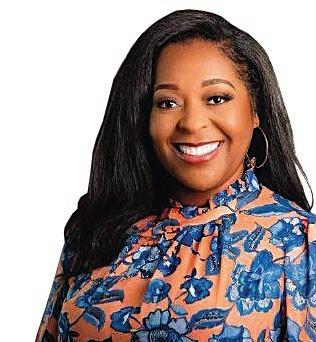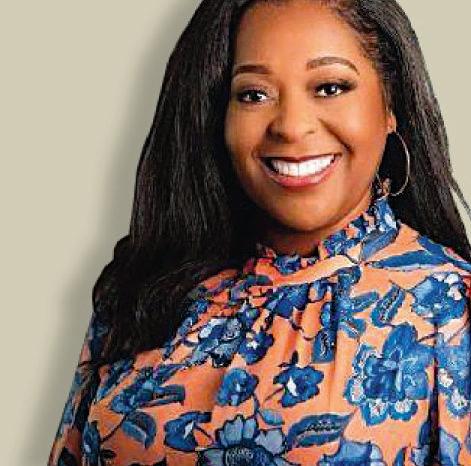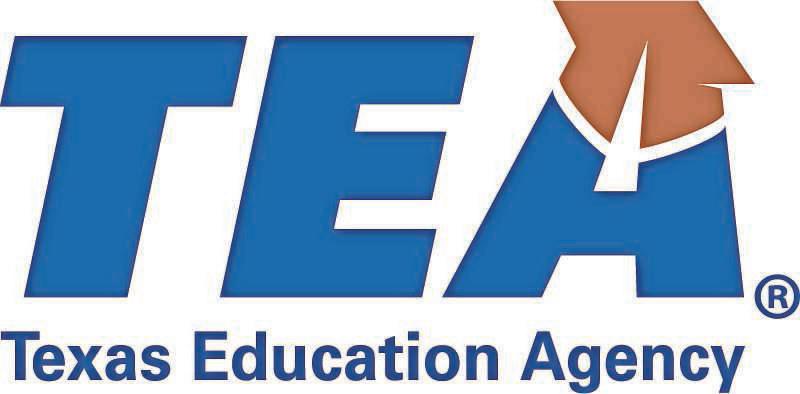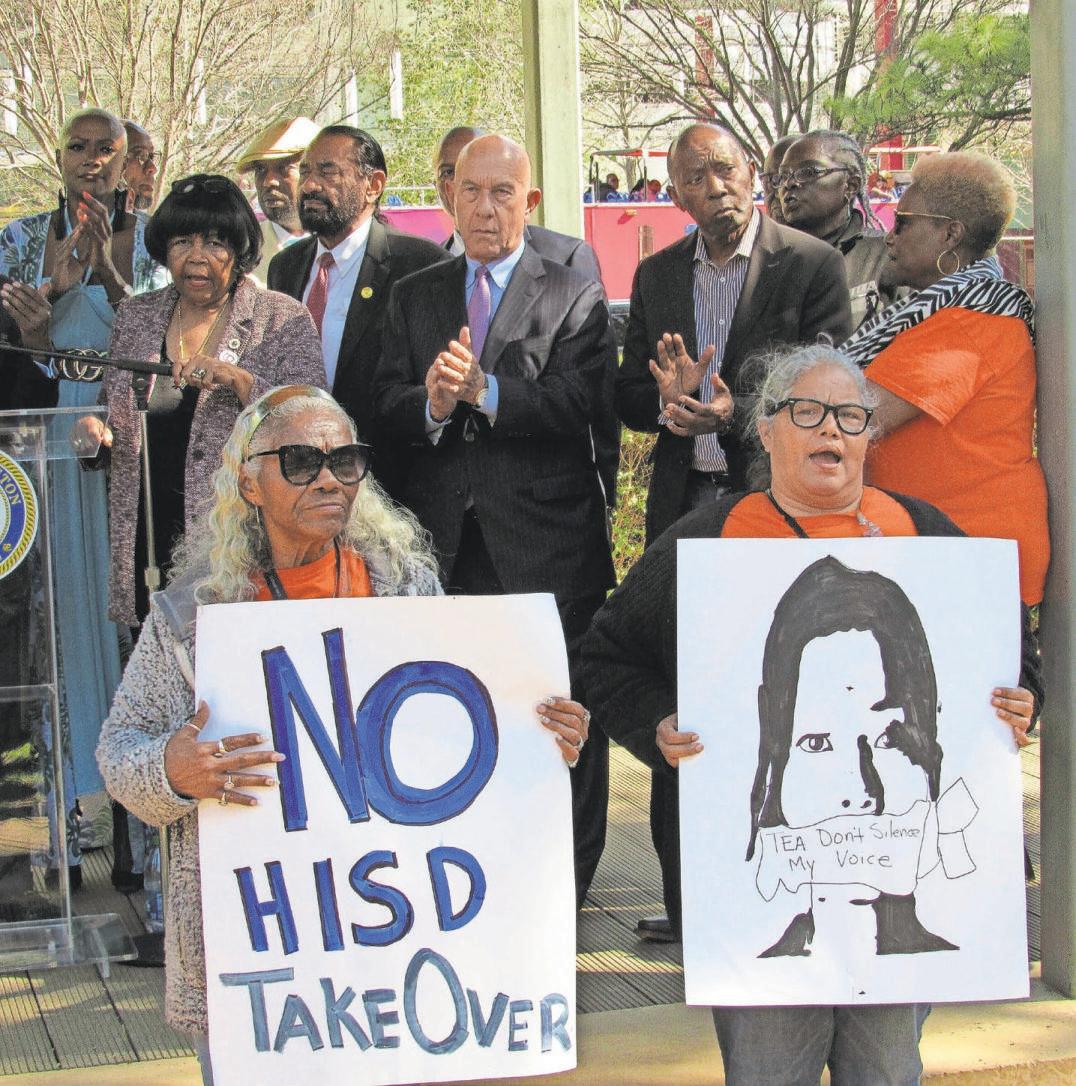


























It has been a year since the infamous slap heard worldwide delivered by Will Smith to the jaw of Chris Rock at the Oscars. Jimmie Kimmel hosted this year’s Academy Awards. Not only did the Oscars run smoothly, but it also had its share of hits and misses. Let’s start with the misses, shall we? It was evident that Black actors and directors who dominated last year got snubbed again. Only two Black actors earned Oscar nods: Angela Bassett for her second career nomination for “Black Panther: Wakanda Forever” [30 years afer Best Actress nod for the 1993 flm “What’s Love Got to Do With It”] and Brian Tyree Henry for his role in “Causeway.” Neither of them won. Ruth E. Carter won her category for best costume design for “Wakanda Forever,” making her the frst Black woman to win a second Oscar. I’m so happy that she won, but wow, why is she the only one in 2023? Rihanna and Tems lost their frst-ever nomination for the best original song “Lif Me Up” from “Wakanda Forever.” Tat’s probably why Denzel skipped the Oscars for an NBA game with Spike Lee on the same day. Still, there were some highlights. Michelle Yeoh was the second woman of color and frst Asian to win the best actress award at 60 years old, and the “RRR Movie” brought India’s frst-ever Oscar in the Best Song Category with “Naatu Naatu.”

We are in a new era, with little faith in a college degree’s value. It’s difcult not to be empathetic to this sentiment considering many young adults are turning to hourly jobs or careers that don’t require trades or skipping college to avoid getting into debt or having to take odd jobs to pay back those loans. Te problem is complex, and with the clock ticking until millions of student loan borrowers resume making repayments this summer, it will mean more fnancial pressures for millions of young Americans already struggling to stay afoat. According to the Wall Street Journal, many borrowers haven’t made student loan payments since the beginning of the pandemic, and an estimated 40
million people owe $1.6 trillion in total federal student loan debt.
Te pandemic opened the doors for young people to transition away from earning a college degree. Colleges and universities haven’t done a great job making education afordable, and paying it of shouldn’t take 20-plus years. Still, these schools aren’t the only ones to blame. Students must also understand which majors will create a clear path to fnancial stability. Passion doesn’t get you far without a strategy. And vocational and trade schools are getting the fowers they fnally deserve, with trade jobs probably being the most preferred way to make a great living without being saddled with thousands of dollars in debt. Te Supreme Court is expected to rule on a challenge to the mass debt cancellation program by July.
We’ve all heard stories about Black folk (either yourself or someone you know) who don’t trust banks, and afer the Silicon Valley Bank Collapse, I can see why many would be on edge. Tis marks the second-biggest bank collapse in U.S. history. Young startups and small businesses are racing to get their money from the bank. Tis ordeal refects much like the nightmare during the global fnancial crisis in 2008. Only now, the government is choosing to get ahead of a major disaster. Companies with ties to the bank scrambled to pay workers and feared they might have to pause major projects or lay of employees. President Biden said no losses related to the collapse would impact taxpayers, there will be no bailouts and startups have and/or will regain access to their accounts. It’s a good step in the right direction, but in these uncertain economic times, wondering about the safety of your funds is logical right now.


If you’re struggling to pay the rent or utility bills, the Texas Rent Relief Program has reopened its application portal now through March 28.

Te Texas Department of Housing and Community Afairs says frst-time applicants may be eligible for up to 18 months of rent and/or utility assistance for past due bills, and up to three months of future payments, which will be made directly to landlords or utilities.
The state has about $96 million remaining in it’s rent relief fund, which has provided over $2 billion in emergency aid since 2020. It initially closed in November 2021.
director, Texas Department of Houston and Community Afairs.
Texas has made payments to more than 315,000 households to date, and prevented more than 21,000 evictions. Wilkinson said in order to be eligible, a household needs to be fnancially within 80% of their area’s median income or below, and they must be renters.
Deadline: March 28
“Our preference is to pay the landlord directly, or the utility provider directly. That seems to make the most sense, and is the most efcient. But if we can’t get in touch with that landlord, or they don’t want to participate, we’re going send that check to the tenant,” Wilkinson said.
“Te average payout has been somewhere around $6,500 or so in the past, but we’ve had some big ones for people that were way behind and hadn’t yet gotten evicted,” said Bobby Wilkinson, executive
First-time applicants may be eligible to receive up to 18 months of rent and utility relief this time around, either with past due payments, or a combination of past due and up to three months of current and
future payments, made on their behalf.
Wilkinson said they have already received over 4,000 applications on its first day and they are first-come-firstserved, but eviction applications will be
prioritized.
TDHCA says applications will be processed in the order received, prioritizing those facing evictions. Tose applicants should submit their court docket number.
The Mayor’s Youth Council (MYC) and the Youth Police Advisory Council (YPAC) joined forces to host a Fireside Chat with Mayor Sylvester Turner and Houston Police Chief Troy Finner to focus on crime and violence faced by youth.

Youth, educators and parents chimed in to share their experiences and concerns around school safety, bullying, gun violence, gang violence and social media-relate issues and ways to tackle them.
“I’ve spent so many years spending time with youth over my 33 years of service in the Houston Police Department,” Finner said to the audience. “Building those relationship…this is a great setting, but this [conversation] has to happen every day in our schools and in our community.”
Statistics of gun-related incidences in Houston have been alarming. According to the Harris County Institute of Forensic Sciences, 60 children and adolescents under 18 died from gunshot wounds in 2022, making last year the deadliest in at least fve years.
Over the last four years, there were 557 incidences in Texas where students have been disciplined for having firearms in school. As for school fights, there were more than 15,000 reported incidents during the 2020-2021 school
year statewide.
“I’m not saying go and take people’s guns away… but if the state allows for no licenses required, no permitting, no training, then you’re creating a market for guns,” said Turner. “Tere are way too many guns that are out there. So, when people have a fght these days, it ain’t a fst fght anymore. We do need reasonable gun laws in this state. I think it’s a mistake not to have it, and I think we need leaders to stand up and lead.”
During the Q&A segment a parent spoke about her academically-gifted daughter who is a 7th grader and a virtual learner who is concerned about returning to the classroom for fear of bullying and lack of confdence in school safety measures.
Te parent brought her daughter to the freside chat as a way to encourage and ease her stress.
“Tis was our frst freside chat of the year, and I’m very proud of how dedicated our youth are,” said La’Shana Brown, coordinator of Mayor’s Youth Council. “Te goal is for the youth council members to gather the information from this event and fnd ways to implement these suggestions across the city. Tis will be done in the coming weeks.”
Texas Tribune
Te Texas Senate has given initial approval, on a 19–12 vote, to legislation that would raise the penalty for voting illegally from a misdemeanor to a felony, a priority for Texas Lt. Gov. Dan Patrick and other conservative lawmakers who have worked to remake the state’s voting laws since the 2020 election, despite the lack of evidence of widespread voter fraud in Texas.
If Senate Bill 2 becomes law, a person found guilty of the crime could face up to 20 years in prison and more than $10,000 in fnes.
Te debate on the foor between Democratic lawmakers and Sen. Bryan Hughes, R-Mineola, the bill’s author, focused heavily on what constitutes illegal voting. Lawmakers disagreed over whether, under the bill, a person who mistakenly votes illegally could be prosecuted. Democrats pointed to examples such as a person who knows they have been convicted of a felony but doesn’t realize that makes them ineligible to vote or a person who knows they are not a U.S. citizen but does not know that makes them ineligible.
Some Democratic lawmakers told Hughes they were worried such voters would be prosecuted for “innocent mistakes.”
“I just would ask you to consider the unintended
consequences of your proposal,” Sen. John Whitmire, D-Houston, told Hughes. “We’re all against voter fraud. But to give it the gravity that you are today really frightens some of us who have worked with voters that are just not going to be as informed as perhaps you assume they are, such as someone coming of of parole, such as a 17-yearold high school student.”
Hughes repeatedly defended the bill and said that individuals would be prosecuted only if they “knowingly and intentionally” voted illegally. Republican Sen. Joan Hufman, R-Houston, reiterated that a prosecutor would take into account all circumstances.
Voting rights advocates say they were glad to see lawmakers who oppose the bill bring up how the new bill could open the door for potential “rogue prosecution of voters.”

Katya Ehresman, voting rights program manager for Common Cause Texas, said everyone knows a voter, a friend or a neighbor who could be afected by the pending legislation.
Ehresman said that in some scenarios a person might attempt to vote absentee by mail because they’re 65 or they’re disabled. If they can’t tell whether their ballot was received and are confused about whether their vote was counted, they might try to go vote in person and cast a provisional ballot.
“Tat voter could be liable under SB 2 for a felony penalty” because they were aware they had already cast a ballot by mail, Ehresman said. “Especially if their mail-in ballot was counted that same day. Tat’s one kind of concern that we potentially see with SB 2.”
A new study has shown a huge racial diference in infant deaths.

Researchers found that babies born to African Americans had the highest rate of sudden unexpected deaths in 2020.
Te authors concluded that Black infants die nearly three times the rate of white babies. Te Centers for Disease Control and Prevention released research that found a 15% increase in sudden infant deaths among babies of all races from 2019 to 2020.
In the United States, SIDS (Sudden Infant Death Syndrome) is the third leading cause of infant death afer congenital abnormalities and premature birth. SIDS is also the most common cause of infant death in the United States.
Te authors attributed the rise in SIDS cases to diagnostic shifing, where causes of death are reclassifed.
They said the rise in deaths among Black infants happened at the same time the coronavirus pandemic started in late 2019. Te virus disproportionately afected Black communities.
“Evidence does not support direct or indirect efects of the pandemic on increased rates of sudden unexpected infant death, except for non-Hispanic Black infants,” the study authors stated.
Tey have called for more research, but also noted the many ways in which the pandemic wreaked havoc on African Americans. Te study found that SIDS death
increased by 15%, from 33.3 deaths per 100,000 babies born in 2019 to 38.2 per 100,000 babies born in 2020.
In data collection, both SIDS and incidents of accidental sufocation or strangulation fall under the umbrella term SUID, or sudden unexplained infant death.
Unlike SIDS, the rates of SUIDs are categorized by race and ethnicity, and researchers found an increase in unexplained deaths in Black infants.
Tey didn’t fnd an increase among any other group.
Te study’s author, Sharyn Parks Brown, told NBC News that the fnding was absolutely a surprise. She is a senior epidemiologist for the CDC’s Perinatal and Infant Health Team.
“Te racial and ethnic breakdowns of such deaths had been consistent for decades,” she said.
Reasons for the jump are unknown, NBC reported.
Te authors said that the increase could be a statistical anomaly. Tey said they would check the data for several more years to see if the increase was real or not.
It could also refect adjustments the National Association of Medical Examiners made in 2019 to how sudden infant deaths are classifed on death certifcates.
Te guidance also said fnding babies on or near sof bedding was not enough to say the deaths were caused by sufocation, because there was no evidence the airways had been blocked. Tose cases, according to the recommendations, should be classifed as SIDS.
“If the new guidance was followed, this could have led to increased reporting of SIDS,” the study authors wrote.
VOLUME 92, NUMBER 18 - MARCH 16, 2023
Publisher | CEO
Sonceria Messiah-Jiles
Strategic Alllance Clyde Jiles
Digital Content Manager
Get Current Studios
Managing Editor ReShonda Tate
Associate Editor
Aswad Walker
Education Reporter Laura Onyeneho
Sports Terrance Harris
Jodie B. Jiles
Photographer Jimmie Aggison
Social Media Manager
Tia Alphonse Jordan Hockett
Researchers: Sudden unexplained deaths rose for Black infants
 By Aswad Walker
By Aswad Walker
Kevin Johnson, a doctoral student at Texas A&M University (TAMU), was beyond excited about his upcoming presentation at the school’s 4th Annual RISE (Race, Inclusion and Social Equity) Conference, on March 24. However, he was saddened upon receiving word that the conference was “postponed.”
“It’s not just that I don’t get to make a presentation, because there’s other opportunities I have to share my data and engage with others; it’s sad for the university itself because these are the sorts of discussions and presentations we should be having,” said Johnson, who earned his undergraduate degree from TAMU 40 years ago, before recently returning to work toward a Ph.D.
The conference is part of TAMU’s RISE Initiative, a yearlong program that provides students with a better understanding of race, identity and social equity in higher education.

The initiative includes an annual conference and fellowship opportunity which allows selected student leaders to attend the National Conference on Race and Ethnicity (NCORE), conduct research, and present findings to the campus community at the RISE Conference.
But with no reason given for the postponement of this year’s gathering, individuals are










speculating that the decision to “pause” the conference may be related to Texas A&M’s moves to distance itself from all things DEI (Diversity, Equity and Inclusion).

The news of the postponed conference came just weeks after an op-ed (“How Texas A&M Went Woke”) by rightwing Boise State University professor and conservative think tank member Scott Yernor who called for TAMU and all Texas universities to defund and dismantle all DEI policies.
Yernor contends such policies are part of an evil “woke agenda” hell-bent on destroying America and eroding universities’ intellectual integrity.
“Knowing what’s going on is the first step. Action to change it is the second step,” wrote Yernor. “We call on the political actors of Texas—from the governor to the Board of regents—to cut DEI budgets, to add enforcement mechanisms to Texas bans on racial preferences, to redirect the university to a mission emphasizing professionalism and meritocracy, to close down units
on campus that are too infused with DEI mandates, and to undertake other efforts to return Texas A&M and other universities in Texas to a mission consistent with American principles.”

There is no admitted link between Yernor’s op-ed and the decision to postpone the RISE conference. However, on March 2, less than a month after Yernor’s piece, TAMU System Chancellor John Sharp directed leaders of its 11 universities and eight agencies to stop asking job candidates for statements about their commitment to DEI.
“No university or agency in the A&M System will admit any student, nor hire any employee based on any factor other than merit,” Sharp said in a directive sent to university leaders.
Sharp may have been responding to Texas Governor Greg Abbott’s “warning” to state agency and public university leaders that the use of DEI initiatives — policies that support groups who have been historically underrepresented or discriminated against — is illegal in hiring.
As of yet, Abbott and the Texas Legislature haven’t outlawed conferences that discuss racial and social equity. However, Texas’ Senate Bill 3 in 2021 was passed and has become known as the “anti-critical race theory law,” making state public school teachers wary of discussing issues conservatives deem to be controversial (i.e. race, diversity, inclusion and social equity).


And though Abbott’s door slam on DEI initiatives related to hiring doesn’t mention shutting down conferences such as RISE, Yernor’s Clairmont Institute-backed article calls for exactly that.
Less than a week after Sharp shut down DEI initiatives on all TAMU System campuses, Johnson received news that his presentation would, best case scenario, have to wait until further notice. Worst case, neither Johnson’s nor the other RISE presenters’ sessions on creating a more equitable society will take place at all.
“In the climate that we’re in currently, it appears that DEI is in the public and political discourse. And it is something that people need to maybe get together in the same room and talk things out. But it seems as though there are sort of top-down decisions being made, and then you end up with an email that says, ‘Oh, by the way, your conference is not gonna happen.’”
“The District’s top priority is, and will continue to be, student outcomes. The Board hopes that TEA has a clear and transparent process for this announced transition that is communicated to the community and the District.”


HISD Board of Trustees
What happens now?
New board members apply and will be selected.
Who does the Board of Managers consist of?
Now that the Texas Education Agency (TEA) has announced it’s taking over of Houston Independent School District (HISD), many are left wondering, what happens now. In short, nothing right now.


TEA Commissioner Mike Morath said there will be no immediate changes, though Superintendent Millard House II and the current trustees of HISD’s board will eventually be replaced with an appointed Board of Managers.
“Even with recent improvements and despite good intentions from many, Houston ISD as a system continues to allow chronically low achievement in multiple schools,” Morath said.



The state will appoint a nine-member board of managers to replace the current board of trustees by June 1. Morath said the new board will be a diverse group who live and work within the HISD district lines.
The application process for that board is open now.
The move comes after years of what the state considers dysfunction and a failure to properly educate all children. In 2019, HISD had 21 schools that received an F grade. Though that ranking has since improved, Morath says intervention was still necessary.
“Ultimately, this intervention is necessary to shore up support for students in those (struggling) schools. This was extraordinarily difficult. We live in a democracy, and one of the elements of that democracy is locally-elected school boards,” Morath said. “What that law requires is if that threshold is ever met, that the commissioner of education is required, it’s not discretionary, is required to either order a closure of that school or order a board of managers for the whole district.”
Morath estimates the board will oversee HISD for at least the next two years.
“What we’re doing under this intervention is we are choosing nine individuals who are Houstonians who will be the Board of Managers, and they will assume all the powers and duties of the elected school board,” said Morath. “So it’s essentially a shift in local control from the current locally elected board to an appointed board of nine.
“They then have all of the duties and
obligations to govern the school system like any governing body in the State of Texas, so they’ll oversee the superintendent. They’ll set strategic direction. They’ll set budget. Their job as a team is to be focused like a laser on the needs of students above all else.”

Houston Mayor Sylvester Turner was among the many local leaders who blasted the move, emphasizing that failings reported in the district in 2019 have significantly improved.
“They keep going back to 2019. But the status of HISD in 2019 is different than what it is four years later in 2023. Under this superintendent and this pretty much new board, significant progress has been made,” Turner said. “Forty of your 50 schools that were in that D or F category are no more.

Forty of the 50 are now in a much better status; the schools they keep referring to.”


In 2019, HISD had 21 schools that received an F grade. This past August, for the first time in eight years, Wheatley High School, which was one of those F schools, had a passing grade.
“We asked them to do better and they have done better,” Turner said. “You don’t reward success by penalizing not just that school, but you’re taking over 275 other schools as well.”
HISD is now the 16th school district to be taken over by the TEA since 1991, and Houston Federation of Teachers president Jackie Anderson believes the move spells trouble for all impacted.
“Parents should be very concerned and the reason why is because one man basically told them that their vote doesn’t mean anything. It was nullified,” Anderson said.

“Those trustees were elected by the citizens of this community. We’re disappointed because we believe in democracy and there is no reason other than what they keep calling a law that is allowing them to do that.”
Anderson said takeovers are not in the best interest of the children.
“You have 30 years of history and research that shows that takeovers do not work. One thing we know is that Texas AFT and Houston Federation of Teachers are going to be here no matter what. We’re not going anywhere. Our advocacy for our students and teachers will remain the same.”
She urged parents to be vocal about the decision.
“[Parents] should write to the governor. They should continue to write to their leadership. They should let them know that they are disappointed. The laws can be changed. They are in session right now. [Legislators] can do something if they want to,” she added.
“I stepped into my role understanding the obstacles we faced as a district, including a looming TEA intervention. My team and I remained focused on building a framework that prioritized a high-quality educational experience supported by world-class talent for all students. I am proud to say, in the last 19 months, we have already seen vast improvements. Because of the hard work of our students, teachers and staff, we have lifted 40 of 50 schools off the D or F TEA accountability ratings list. Together, with our parents, community members and leaders, we developed the district’s first comprehensive five-year strategic plan to build a better HISD.”
HISD Superintendent Millard House II
“What the governing body is there to do is: to set a strategic direction, to create focus to make sure the tone at the top is one of innovation and service toward students above all else, to make sure they can make decisions related to resource allocation within the school system so kids at every school in Houston, not just some schools in Houston, have access to rigorous extracurricular activities, advance coursework, that can help improve the lives of kids regardless of where they are geographically in Houston. It just takes focused leadership.”
TEA Commissioner Mike Morath

“I’ve been talking with the Department of Education and hope to speak with them today. I believe this is a discriminatory action and that this impacts the [constitutional] Equal Protection of the Law and Due Process, and asking for the Department of Education to intervene and investigate. They are in the midst of having their department look at all aspects; they told me that last week that they were reviewing all the information have given them.”
Congresswoman Sheila Jackson Lee
“The Hostile Takeover of HISD is a crime against 200,000 children, against public education and against the Houston community”
Dr. James Dixon, Houston NAACP President
Those who serve on the Board of Managers don’t have to have a background in education. Morath says the TEA’s goal is to find a diverse set of backgrounds.
What happens to the current board?
Superintendent Millard House II and the nine board members will be replaced. (No date determined)
Who decides the new superintendent and board members?
TEA Commissioner Mike Morath gets the final say.
What rights will the new board have?
Appointed board members have the same power as elected board members.
Will any HISD schools close with the takeover?
No, at least for now. Morath said the takeover is not about closing schools but restructuring their support.
What will happen to Wheatley High School?

Morath says the consistent academic failures at Wheatley High School, as well as alleged misconduct by previous board members, is what led to the takeover. Wheatley has since improved to a C, so it is no longer in danger of closing. in fact, Morath says no HISD schools are closing… for now.
Is this takeover permanent?
This is a temporary intervention and that at some point, HISD will return to democratically-elected board members. It’s unclear how long the takeover will last. However, by law, the takeover will last at least two years.

What must the district do to get local control back?
No schools can have any more multiple years of D-F ratings. They have to have special education in compliance and the procedure of the board needs to be focused on student outcomes.
You cannot run school districts, cities and counties from Austin, Texas. You tell me how this benefits the kids? Instead of grading the students and the teachers, the Texas Education Agency needs to grade themselves on how they are handling this matter. I give them an F.”
Mayor Sylvester TurnerMorath House People hold up signs at a news conference protesting the TEA Takeover. AP
This month’s Black Business Spotlight turns its attention to Scrubs to the Rescue, a Black woman-owned Houston business founded in 2019 by three sisters in the healthcare profession with a passion for fashion.

Since its founding, Dr. Tennille Johnson bought out the other two co-founders to become the sole owner of Scrubs to the Rescue, a business model that was started because Johnson and crew realized it was hard for healthcare professionals to find time to shop for essentials like uniforms before the COVID pandemic and even more so during the pandemic. The company solved that problem by bringing scrubs and more to customers via a mobile operation.
Now, thanks in part to Johnson’s relationship with JP Morgan Chase and the bank’s commitment to helping businesses in majority Black and Latinx communities, the company has a brick-and-mortar location. And, it’s expanding to the online space, as well.
The Defender sat down with Johnson to learn more about the past, present and future of Scrubs to the Rescue.
DEFENDER: Where did this idea foryourbusinesscomefrom?
DR. TENNILLE JOHNSON: I’m just a fashionista, normally. So, when I started to see that scrubs were developing and becoming a fashion trend, I really wanted to have an impact on that. I want to make sure my healthcare professionals look good because when you go to work and you look good, you feel good, you just perform a lot better. So, to be a part of that, contributing to other healthcare professionals, that’s kind of like how it started. And then it just flourished from there and it’s been a really good business opportunity for me.
DEFENDER: Areyou still a healthcare professional and entrepreneur?
JOHNSON : I’m still a pharmacist, and I do the business full-time now. I pretty much just do PRN (Latin Pro re nata; “as the circumstance arises”) as needed pharmacy work, but I work my business full-time.
DEFENDER: What didyou do to make Scrubs to the Rescue successful?
JOHNSON: I’ve always wanted to have something, like some type of residual income, something flexible. I love flexibility. I’ve always been in management with my career because of that. I didn’t want to just keep doing the same thing every day. We actually have a retail location now, but we started off mobile because it was a need. Like in my healthcare profession, you couldn’t find anybody who would come out and do sales for uniforms. So, we started off that way and then it just kind of flourished from there.
DEFENDER: How’s it going now thatyou are the sole owner?
JOHNSON: It’s going great. One of the things I really wanted to do is infuse technology and innovation. So, we have a scrub subscription, which is really doing well and is probably one of the only ones in this uniform industry. And then we’re planning on infusing some more technology in the future, like virtual fitting rooms, so that if
you don’t want to come into the store, you still have an avenue to select the right uniform that’s going to meet all your needs.
MORE ABOUT TENNILLE JOHNSON & COMPANY
WEBSITE: www.ScrubsToTheRescue.com
INSTAGRAM, FACEBOOK & LINKEDIN: Scrubs2theRescue
ADDRESS: 8000 S. Gessner Road, Suite 500, Houston, TX 77036
HOMETOWN: Chicago
EDUCATION: Texas Southern University’s College of Pharmacy
Colorectal cancer – cancer of the colon and rectum – affects men and women equally and is the second-leading cause of cancer-related deaths in the United States. Sadly, more than half of all colorectal cancer deaths might have been prevented by early detection through colon cancer screening. Getting screened is your best medical defense against colorectal cancer because it’s one of the few cancers detectable in a precancerous state.
New screening guidelines recommend men and women at average risk for colorectal cancer be screened starting at age 45. If you have a close relative with colorectal cancer or you have an inflammatory bowel disease, you may need to start screening at a younger age and be screened more often. At KelseySeybold, we offer a variety of colorectal cancer screening techniques depending on the individual patient’s situation. Colonoscopy is considered the “gold
FROM THE DOC
“For years, the recommended age to begin screening the average-risk population was age 50. However, 45 is the new recommendation.”
Dr. McGee is a Gastroenterology specialist at KelseySeybold Clinic.


standard” as the screening technique most preferred by the American College of Gastroenterology.
Colorectal cancer is 90% beatable in the early stages.
The key to beating this disease is through early medical detection. Here’s why: Most colon cancers begin as a benign polyp. If the polyp is detected and removed soon enough, most colon cancers can be prevented from forming – hence the importance of recommended preventive screenings. Don’t wait for symptoms before getting screened.
The most perplexing barrier to early detection of colorectal cancer is the lack of clear symptoms. The primary symptom – rectal bleeding or blood in the stool – might be attributed to hemorrhoids, ulcerative colitis, or inflammatory bowel disease. However, once there’s blood in the stool, cancerous polyps may have been
developing and advancing for 10 years or more.
5 ways to help reduce your risk:
1. Maintain a healthy weight. Excess body fat is linked to a higher risk of colorectal cancer.

2. Exercise regularly. Staying active by getting between 75 and 150 minutes of exercise per week can help reduce your risk.
3. Add more fiber to your diet. Fresh fruits, vegetables, and oatmeal are good sources. Limit red meat. Avoid hot dogs and bacon.
4. Cut back on alcohol. Don’t smoke or use nicotine.
5. Have regular, doctorrecommended colorectal screenings.
Dr.McGeecaresforpatientsatthe FortBendMedicalandDiagnostic CenterinSugarLand.
Kelsey-Seybold welcomes new patients and accepts more than 50 health insurance plans, including Aetna, Blue Cross Blue Shield, Cigna, Humana, UnitedHealthcare, and many more.

We have 35 convenient locations close to home and work –and still growing!

Rockets rookie forward Jabari Smith had a double-double with 20 points and 10 rebounds during a recent 119-111 loss to the Chicago Bulls.
The Texans are forfeiting a fifth-round draft pick in the 2023 NFL Draft and must pay a $175,000 fine for violating the league salary cap guidelines when the team paid for former quarterback Deshaun Watson’s membership to an athletic facility in 2020. The cost of the membership was $26,777. The violation surfaced during the league’s investigation into the sexual misconduct allegations against Watson. Teams are not allowed to provide players benefits beyond their contract.




It seems that former Texans coach Lovie Smith’s last laugh has gotten much louder. The Chicago Bears have traded their No.1 overall pick in the upcoming NFL Draft to the Carolina Panthers, who are certain to take the quarterback the Texans covet, Alabama’s Bryce Young. Remember, the Texans lost out on the No.1 overall pick when Smith elected to go for a 2-point conversion to win the meaningless regular-season finale against the Colts. Now, the Texans will have to decide between Ohio State’s C.J. Stroud or Florida’s Anthony Richardson at quarterback. Or they could elect to trade out of the No.2 overall pick to acquire more draft picks.

Former Texas Southern basketball player and current academic advisor Camille Mills has been selected as one of 13 recipients nationally to receive the 2023 N4A Opportunities Scholarship. Mills

was the first TSU student-athlete to graduate as her class salutatorian and earned summa cum laude honors. She has since received a master’s degree in Sports Studies and Leadership from TSU in 2019 and now works to help student-athletes at TSU achieve academic success.
Texas Southern junior infielder Jaden Jones went a combined 5-for-6 at the plate while scoring six runs and managing five RBI during a two-game sweep of Arkansas Baptist.

All roads to the Final Four lead directly to Houston this year.
But for basketball fans in the area, there is a much more vested interest in this year’s NCAA Tournament with a few teams from Texas seeming to have a great shot at reaching the Final Four at NRG Stadium.
The University of Houston Cougars appear to be a favorite to compete for the national championship in their own backyards after being awarded the No.1 seed in the Midwest Region. It’s just the second time in school history the Cougars have received a No.1 seed in the NCAA Tournament.
But the Coogs are far from alone in the race to Houston with Texas having seven schools in this year’s 68-team NCAA Tournament field. The second-seeded Texas Longhorns have been impressive this season and seem to be playing their best basketball at the right time, as they come into the Tournament having stunned Kansas in the Big 12 Championship Game. An Elite Eight showdown between the Cougars and Longhorns could be in the making.
Texas A&M is back in the NCAA Tournament for the first time since 2018, following a strong run through the SEC Tournament that ended with a loss to No.1 seed Alabama in the championship game.
Also making a third-straight appearance in the NCAA Tournament are Johnny Jones’ surprising Texas Southern Tigers, who will face Fairleigh Dickinson in a First Four game Wednesday for the right to face No.1 seed Purdue in the East Region. The Tigers have won their play-in game the last two years to advance to the first round of the NCAA Tournament.

TSU, which lost its final three regular-season games, made it this season by running to the SWAC Tournament championship as the No.8 seed. It is the first time in SWAC history that an eighth seed won the conference tournament.
Here is a look at the teams from around the state who are playing in this year’s NCAA Tournament.
University of Houston
Record: 31-3
Seed: No.1
Region: Midwest
First up: No. 16 Northern Kentucky, Thursday
Prospects for advancing: There is
Houston coach Kelvin Sampson reacts to a call during the first half of the team’s NCAA college basketball game against Memphis, Sunday, Feb. 19, 2023, in Houston. AP

considerable debate whether the Cougars deserved the second overall No.1 seed over Kansas, but they can quiet that with another strong run. UH will need to get star guard Marcus Sasser (groin) back healthy because the road to Houston will get real tough in the second round where the winner of the Iowa/Auburn first round matchup awaits.
Texas Southern Record: 14-20
Seed: 16
Region: East
First up: No. 16 Fairleigh Dickinson, Wednesday
Prospects for advancing: As expected, the Tigers will have to win a First Four game in order to make the official 64-team NCAA Tournament field where No.1 Purdue awaits the winner in the first round on Friday. TSU has won its play-in game the last two years and will be looking to make it three straight. The Tigers are led by seniors PJ Henry, John Walker III and Joirdon Karl Nicholas, who are in the NCAA Tournament for the third straight year.
Texas A&M
Record: 25-9
Seed: 7
Region: Midwest
First up: No. 10 Penn State, Thursday Prospects for advancing: The thought was the Aggies would be seeded a little higher, but the blowout loss to Alabama
in the SEC Championship Game perhaps dropped them down in the minds of the NCAA Selection Committee. They have a tough first-round draw to start, facing a dangerous Penn State team. But even if the Aggies survive the first-round, they will likely face old Big 12 rival No.2 Texas in the second round.
University of Texas
Record: 26-8
Seed: 2
Region: Midwest
First up: No. 15 Colgate, Thursday Prospects for advancing: Interim coach Rodney Terry’s Longhorns could be a sleeper in the Tournament after a stronger than expected season, which was capped when they stunned No.3 and Big 12 favorite Kansas to capture the Big 12 Tournament championship for just the second time in school history. Look for the Longhorns and Cougars to meet for the right to come to Houston for the Final Four.
Baylor Record: 22-10
Seed: 3
Region: South
First up: No. 14 UC Santa Barbara, Friday Prospects for advancing: The Bears are again talented but perhaps not as talented as some other teams. But you can never completely count out any of Scott Drew’s teams, which are usually scrappy and capable of winning big games in March and April. Baylor can score with most, but their biggest deficiency is defense and that is important at this time of the year.
TCU Record: 21-12
Seed: 6
Region: West
First up: No. 11 Arizona State/Nevada winner, Friday
Prospects for advancing: It doesn’t look good for the Horned Frogs big man Eddie Lampkin Jr., who quit the team over an apparent issue with the coach, which means they will have to rely more heavily on their transition game with Mike Miles leading the fast-breaks. TCU will definitely need more from Charles O’Bannon if they hope to advance.
Te Booker T. Washington varsity boys basketball program’s historic run has come to an end as they fell to Oak Cliff Faith Family Academy and fnished as 4A State runner-ups.

Washington had high hopes of bringing their frst state championship under the UIL era back to Houston. While being the oldest predominantly Black school in Houston to go to state in basketball, Washington has only had two coaches during the UIL era: Coach Clarence Stubblefeld who was the head basketball coach for 43 years before retiring, and Coach Vincent Grayson who now has been the head coach for 16 years.


“That’s huge, the kids don’t know how important it is yet, and it hasn’t soaked in with me yet, but it will. I know how important it is and what it means to the community,” said Grayson.
Ricky Johnson, a 1997 BTW grad, expressed his excitement about what this run meant for the community.
“It was a real boost all over the district. It uplifed the community,” Johnson said.
Last season BTW’s hopes of making it to state were cut short by a hardworking team in Silsby. Seeing how hard his team worked, Coach Grayson knew good things were in store for the program.
“We knew we had something special at the end of last year, but we had to make some
adjustments,” said Grayson.
Washington opened the 2022-2023 season with a 70-80 loss to Oak Clif Faith Family Academy, but came back and beat a powerful Beaumont United team 71-65. As they continued to self-identify, they would also sufer a tough, one-point loss to district rival Furr.
“After we lost against Furr in district it really hurt us, so we made some adjustments. We played one more district game and then we went to that VYPE tournament and we hadn’t lost since,” said Grayson.
Behind Chris McDermott, who led the team in rebounds and blocks, Kenneth Lewis Jr. who averaged 19.8 points per game, Odis Carter who led the team in both free throws and threes made, Davion Smith who led the team in steals, and Andre Walker who led the
team in assists, BTW not only made adjustments but showed growth as a unit.
Washington ended their historic season the same way they started it, with a head-tohead match against Oak Clif Faith Family Academy.
“We played this team the frst game of the year and coach told me, he said, ‘Coach, I’ll see you in San Antonio.’ I’m like, whoa. And guess what? He saw us in San Antonio in the championship game,” said Grayson.
With community support and a strong coaching staf, afer the loss it was evident that this run was more than just about basketball.
“I try to teach them when they graduate from high school to be good men, good citizens. Basketball is a good tool to get you places. It got me to college and it can do the
same for them. If you’ve still got breath, you have a chance in life. I frmly believe that. Tese guys come to work every day. Tey believe in me and I believe in them,” said Grayson.
“They’re the best kids. I can always be proud of them. Tey will always be remembered and we’re going to continue to fght for success the Washington way; that’s how we do it. We are still winners,” said BTW Principal Dr. Carlos Phillips II.
Education is a form of resistance that Black people have used for decades to fight various systems of oppression. Black History Month and Women’s History Month serve not only as a time to celebrate the achievements of African Americans throughout U.S history, they are also moments to reflect on the struggles and triumphs of past generations, and those today who continue to be the change they want to see in their communities.
Errica Dotson is a Houston-based leader in education and the acting executive director of Writers in the Schools, an organization dedicated to improving children’s academic, social and creative abilities through reading and writing. She is the first Black woman to hold that position.

The Los Angeles native began her career in education 20 years ago as a Teach for America Corps Member, teaching 6th grade ESL [English as a Second Language] at HISD. Later, she served as an instructional leader, assistant principal and school support manager in HISD. She also served as the manager of teaching and learning for the Harris County Department of Education.
She’s dedicated her career to “create innovative learning experiences” for her students to “unlock their own passion and creativity.”
Dotson spoke with the Defender to share what she’s learned throughout the years.
DEFENDER: What interested you in being an educator?
ERRICA DOTSON: My mother was the product of the Los Angeles Unified School District in the 1960s and 70s, and when she entered the workforce, she realized that she didn’t have the tools needed to be able to matriculate successfully through her career. She pledged to herself to do whatever she could to ensure that her children received the best education. She sought out a program called “A Better Chance,” and I was able to attend an independent school in Los Angeles on a full scholarship. That experience was revolutionary for me to use my education to impact the lives of my family and community members.
DEFENDER: How were you able to successfully turn low-performing schools around?
DOTSON: I went to seminary after two
years of Teach For America. I learned about my Christianity, spiritual truth and awareness. Eventually, I transitioned into Christian education because there were many challenges immigrant families faced in the communities I taught in. One parent could be working to provide for multiple kids, dealing with food insecurity, having an incarcerated parent, or watching students struggle with alcohol and drug problems. I wanted to be better equipped with tools for the school setting and my sanity and security. I was part of a turnaround team at Dogan Elementary during the 2017-2018 school year. About 10 schools in HISD were in danger of a state takeover, and students consistently failed the state test. I wanted to look at previous years’ test scores to see how students fared. Many third- to fifthgrade students needed a basic reading level. I spent time with my principal, who had a background in early childhood education, to get them caught up. At the time, we bought curriculum through McGraw Hill for corrective reading. It took a lot of time and consistent readjustment before we saw progress. In a period of [four] months, kids improved their reading skills. The next step was decoding. We were able to integrate that into the ELA classroom. Later, I became the Manager of Teaching and Learning at the Harris County Department of Education. The work allowed me to interact with 26 school districts and make a broader impact.
DEFENDER: Why is reading and writing a focus ofWriters in the Schools?
DOTSON: Writers in the Schools is essential because it merges everything I love, like reading, writing and working with teachers and students. Since 1983, the organization has engaged children in the joy and the power of reading and writing. The goal is to revolutionize the way reading and writing are taught. In schools, children are taught to prepare for tests, not writing for self-expression or pushing the needle forward to impact change in their communities and families, or at least to own their thoughts. What they think matters, and we have to nurture the growth of their imagination. We partner with authors, journalists and poets to work in tandem with children in the classroom.